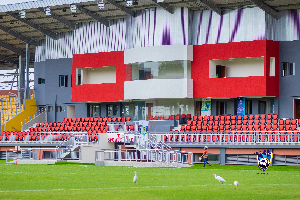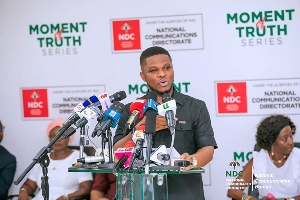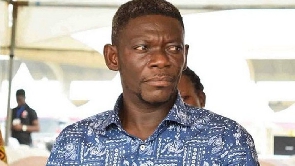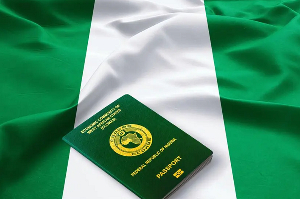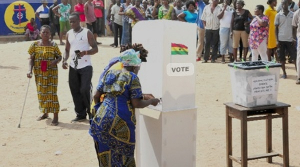- Home - News
- TWI News | TV
- Polls
- Year In Review
- News Archive
- Crime & Punishment
- Politics
- Regional
- Editorial
- Health
- Ghanaians Abroad
- Tabloid
- Africa
- Religion
- Election 2020
- Coronavirus
- News Videos | TV
- Photo Archives
- News Headlines
- Press Release
General News of Tuesday, 1 August 2006
Source: GNA
U.S. awards $547m anti-poverty grant to Ghana
Accra, Aug. 1, GNA) - The United States awarded a 547 million dollar poverty-fighting grant to Ghana on Tuesday, by far the largest grant yet made under a two-year-old U.S. initiative to reward good governance in the developing world.
Ghanaian President John Kufuor and U.S. Secretary of State Condoleezza Rice presided over the signing of the five-year agreement being implemented by the U.S. Government's Millennium Challenge Corporation (MCC).
President Kufuor said his Government would continue with its three pronged programme of investing in people, poverty alleviation and good governance, which had yielded the positive results.
Ms Rice said: "Today represents a great achievement for the people of Ghana and their Government," describing the aid programme as "the largest and by far the most ambitious to date" for the MCC. U.S. officials said the grant aims to improve the lives of the one million poorest rural Ghanaians by raising farmer incomes through private sector-led initiatives.
Ambassador John Danilovich, MCC Chief Executive, said Tuesday's agreement was "a testament to Ghana's strong commitment to good governance and building the necessary institutional framework for the aid to be used effectively".
He said 241 million dollars of the aid would be used to improve the profitability of small commercial farmers, while another 143 million dollars would go toward reducing the transportation costs to farmers in getting their produce to market.
The final 101 million dollars would be spent to expand access to education, water and sanitation, and electricity in rural areas, he said.
The MCC was launched by President George W. Bush in 2004 with the stated aim of providing direct funding to some of the world's poorest countries to promote good governance, economic freedom and growth. Ghana was the ninth recipient of the aid programme following grants to Madagascar, Honduras, Cape Verde, Nicaragua, Georgia, Benin, Vanuatu and Armenia.
In all the MCC has signed aid agreements totalling 2.1 billion dollars.
The Board of Directors of the Millennium Challenge Corporation (MCC) approved the amount for an anti-poverty programme in Ghana. The Programme, also known as a Compact; will benefit more than one million Ghanaians and would focus on rural agriculture, transportation and community development initiatives.
The Compact targets some of the poorest rural districts where poverty rates range from 40 per cent to 90 per cent. The Compact components would raise the income potential of farmers through increased production of high-value cash and basic food crops, an improved transportation network and development of food processing industries and handling facilities.
=93The five-year programme will include initiatives to improve land tenure and access to credit for small farmers and agribusinesses.=94 The Compact also includes interventions to improve access to education, water and sanitation, and electricity in the areas participating in the programme.
"This programme is designed to drive economic growth through the efforts of and for the benefit of some of the poorest farmers and farming communities in Ghana," said Ambassador Danilovich.
"MCC was designed and created to work with and reward nations that have demonstrated a commitment to adopting sound political, economic and social policies that will reduce poverty through economic growth. =93Like all MCA countries, Ghana's participation in MCC's programme is predicated on its dedication to three fundamental principles; ruling justly, investing in people and encouraging economic freedom."
The Programme's agriculture component - the largest component, with an estimated five-year cost of 241 million dollars - would enhance the profitability of commercial agriculture among small farmers by improving business and farming skills, access to credit, land tenure and marketing services.
This component also includes irrigation improvements and rehabilitation of rural roads.
The transportation component with an estimated five-year cost of 143 million dollars includes rehabilitation of a 14-kilometre stretch of the major highway linking the international airport in Accra, the capital, and the port city of Tema.
The statement said the component also included financing for the rebuilding or construction of 230 kilometres of two-lane roads to improve the access to agriculture markets and social services in the Central Afram Basin area.
Improvements to the Lake Volta ferry service to facilitate faster access to markets will also be supported.
The Programme also includes a five-year 101 million dollars rural development component to expand access to community services and to strengthen rural institutions by funding construction and rehabilitation of schools, water and sanitation facilities, electrification of rural areas and providing capacity building support to local government institutions.
This component also includes financing of an initiative to automate and interconnect 121 small rural, community-owned banks and other improvements in the national payments systems that would draw into the financial system, people currently not served or under served. Since its establishment in 2004, MCC has approved Compacts totalling more than 2.1 billion dollars with nine nations, Madagascar, Honduras, Cape Verde, Nicaragua, Georgia, Benin, Vanuatu, Armenia and Ghana.
MCC is also actively engaging with other eligible countries in Compact negotiations.
Millennium Challenge Corporation (MCC), a United States government corporation designed to work with some of the poorest countries in the world, is based on the principle that aid is most effective when it reinforces good governance, economic freedom and investments in people that promote economic growth and elimination of extreme poverty.


